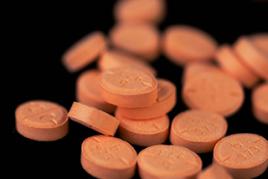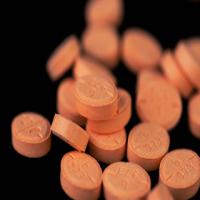Two Digital Telehealth Firm Officials Indicted for Alleged Illegal Adderall Distribution Scheme

Two officials of a California-based digital health company were arrested June 13 on charges related to an alleged conspiracy “to provide easy access to Adderall and other stimulants in exchange for payment of a monthly subscription fee,” the government said (United States v. He, No. 3:24-cr-00329-CRB (N.D. Cal.)).
The charges were the first brought by the Department of Justice (DOJ) for allegedly criminal drug distribution related to prescribing via telemedicine through a digital health company.
Ruthia He, the founder and CEO of Done Global Inc., and David Brody, the clinical president of Done Health P.C., face charges of violating the Controlled Substances Act in relation to their participation in a scheme to distribute Adderall online.
They were also accused of conspiring to commit heath care fraud in connection with the submission of false and fraudulent reimbursement claims for the drug and other stimulants. The two defendants also face charges of obstructing justice.
In the department’s announcement of the arrests, Attorney General Merrick B. Garland said that the two officials “exploited the COVID-19 pandemic to develop and carry out a $100 million scheme to defraud taxpayers and provide easy access to Adderall and other stimulants for no legitimate medical purpose.”
Exploiting DEA’s COVID-19 Telemedicine Rules
The conspirators allegedly took advantage of emergency flexibilities instituted by the DEA during the COVID-19 public health emergency with respect to the prescribing of controlled substances through telemedicine.
During the emergency, the agency allowed a practitioner to prescribe controlled substances without first conducting an in-person examination if:
- the prescription was issued for a legitimate medical purpose by a practitioner acting in the usual course of professional practice;
- telemedicine communication was conducted using an audio-visual, real-time, two-way interactive communication system; and
- the practitioner was acting in accordance with applicable federal and state laws.
“Since the beginning of the COVID-19 pandemic, Done arranged for the prescription of over 40 million pills of Adderall and other stimulants and obtained over $100 million in revenue,” the government charged in a 22-page indictment filed June 12 in the U.S. District Court for the Northern District of California.
“The defendants allegedly preyed on Americans and put profits over patients by exploiting telemedicine rules that facilitated access to medications during the unprecedented COVID-19 public health emergency,” DEA Administrator Anne Milgram said. Done Global sometimes prescribed ADHD medications like Adderall “when they were not medically necessary,” she alleged.
In 2022, the FDA issued a notice of shortages in prescriptions stimulants, including Adderall. “Any diversion of Adderall and other prescription stimulant pills to persons who have no medical need only exacerbates this shortage and hurts any American with a legitimate medical need for these drugs,” Milgram said.
Alleged Deceptive Advertisements
He and Brody allegedly obtained subscribers to the scheme by targeting drug seekers through “tens of millions of dollars” worth of deceptive advertisements on social media networks.
They also allegedly structured Done’s online platform so as to limit the information available to Done prescribers, instructing Done prescribers to prescribe Adderall and other stimulants “even if the Done member did not qualify” for the prescription, and limiting initial encounters between a Done prescriber and a Done member to less than 30 minutes.
In addition, according to the indictment, “He and Brody issued a policy that Done prescribers were not required to have any follow-up encounters with Done members, instituted an ‘auto-refill’ policy that would automatically generate a request by a Done member for a refill, paid Done prescribers solely based on ‘patient load’ (the number of patients to whom Done prescribers wrote prescriptions each month), and refused to pay for patient consultation, time or medical services that Done prescribers provided to Done members after an initial consultation.”
“The purpose, as … He wrote, was to ‘use the comp structure to dis-encourage follow-up,’” the DOJ alleged, “and, as a result, co-conspirator Done prescribers were able to obtain lucrative pay for minimal work, sometimes hundreds of thousands of dollars a year in exchange for writing prescriptions for Adderall and other stimulants without much, if any, in-person or audio-visual telemedicine consultation with the Done members.”
The DOJ said that the two defendants “allegedly persisted in the conspiracy even after being made aware that material was posted on online social networks about how to use Done to obtain easy access to Adderall and other stimulants, and that Done members had overdosed and died.”
Moreover, to forestall government investigations and enforcement action, as well as to induce third parties to keep doing business with Done, He and Brody allegedly made fraudulent representations to media outlets.
Alleged Health Care Fraud
The health care fraud allegations stemmed from allegations that He, Brody and their coconspirators:
- caused pharmacies to dispense Adderall and other stimulants to Doe members in violation of their corresponding responsibility under 21 C.F.R. §1306.04(a);
- caused public and private health insurers to pay for the drugs; and
- caused Done members to continue to pay subscription fees.
According to the government, Medicare, Medicaid and commercial insurers paid more than approximately $14 million for the drugs.
Alleged Obstruction of Justice
The DOJ also alleged in the indictment that He and Brody conspired to obstruct justice after a grand jury subpoenaed another telehealth company.
Anticipating that Done would receive such a subpoena, He and Brody allegedly deleted documents and communications and used encrypted messaging platforms rather than company email.
Once Done itself was issued a grand jury subpoena, the two allegedly failed to produce documents in response to the subpoena.
He and Brody face a maximum penalty of 20 years in prison on the counts of conspiracy to distribute controlled substances and distribution of controlled substances.
Done Statement
In a statement, Done Global said that it “disagrees with the criminal charges” filed against He and Brody.
“Since its founding,” the company said, “Done Global has worked to make mental health care accessible for tens of thousands of Americans trapped in a spiraling national crisis.”
Done Global also said that it is “fully aligned with the [DEA] and the Department of Justice on eliminating drug abuse in America.”
Moreover, the company insisted that clinicians working through the Done platform “have full medical independence on patient care” and that Done Global “does not improperly influence clinicians on prescribing medications to patients.” The firm also said that it had “implemented well-designed protocols to prevent potential abuse of medication.”
The case was investigated by the DEA, the Department of Health and Human Services Office of Inspector General, Homeland Security Investigations, and IRS Criminal Investigation.



